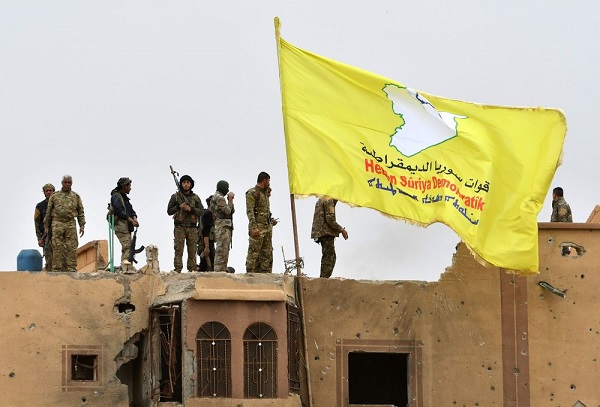Alwaght- Despite talks of alliance with the Syrian central government, the Kurdish groups are yet to take steps to settle the differences with Damascus and go under the umbrella of its protection. The Turkish massive military campaign is now in its fifth day and the Kurdish political leaders said the US has betrayed them and they could shift to an alliance with Russia which in practice means an alliance with the central government.
On Saturday, the Russian Sputnik news agency broke the news about an agreement between Damascus and the Kurds in the north allowing the Syrian Arab Army to head north with heavy military equipment to enter the Kurdish-control town of Manbij. The failure to strike a concrete deal with the government of President Bashar al-Assad comes while the time is moving fast for the Kurds and any waste of opportunity can have irreparable consequences for them.
A set of issues lie behind the Kurdish hesitation. First, some of the Kurdish leaders may have a promising outlook of the developments of war against Turkey. The Kurdish fighters number reaches 140,000. The heavy weaponry and the training provided to them by the US forces since 2014 have been effective in hampering the Turkish military’s easy advances in the first five days of the offensive. The Syrian Democratic Forces (SDF), which is a predominantly Kurdish force with a small number of allied Arab opposition, on Saturday said that they killed 75 Turkish troops and destroyed 7 tanks amid heavy clashes in Ras Al-Ain border town. They added that they restored their control over the town hours after it fell to the Turkish-backed militias.
Second, odds are that the Kurds still hope to see a shift of equations and restoration of the American and European support. On Saturday, the US Secretary of Defense Mark T. Esper asserted that Washington has not abandoned the backing to the Kurds. That is beside announcements by some European sides who said they are banning arms exports to Turkey due to its atrocities in the east of Euphrates.
Such optimism about the return of the Western support may bear irreversible consequences for them. They have already been wasting chances not responding affirmatively to a hand of friendship stretched by the central government. The preliminary consequences are now seen by them in the form of the US betrayal and the actionless stances taken by the European countries in opposition to the Turkish campaign.
The Turkish army launched its first anti-Kurdish campaign, dubbed Euphrates Shield, in 2016 in association with the allied terrorist groups. The second operation was started in early 2018, dubbed Olive Branch. The outcome was the occupation of about 4,000 square kilometers of the northern Syrian territories. Kurdish-controlled towns like Al-Bab, Azaz, Jarabulus, and Afrin were among the major towns seized by Turkey. Turkey reportedly intends to give the region a demographic change characterized by expelling the Kurdish majority on its southern borders and replacing them with 1 to 2 million Syrian Arab and Turkmen refugees currently accommodated by Ankara-provided camps. This addresses Turkey’s two major challenges: the security risks and the refugee crisis.
The important issue is that the Syrian Kurdish leaders consider impossible a behind-the-scenes deal between Washington and Ankara that gives Turkish President Recep Tayyip Erdogan an open hand to redesign the region’s demographic structure. But to their frustration, this is simply possible. The green light to the Turkish military action comes with apparent American knowledge of Ankara’s long-term plans for northern Syria. What looks a common US-Turkey goal in a future Syria is the common interest lying in the partition of the Arab country. Pressing for replacing the Kurdish majority with the Arab loyalists in the north reveals Ankara’s “new Syria” region plot. Even though the Americans wanted such an autonomous region for the Kurds, what is important is the Israeli interests in Syria split. Washington does not want Turkey to embrace Russia as a newly arriving actor in the region. Such interests made the US issue permission for the demographic change project by Erdogan.
In preventing this scheme, the only resort is the Kurdish tendency towards cooperation with the central government and receiving assistance in the face of the Turkish incursion. Syria’s army has already shown off its capability to help. A month ago, it bombed a Turkish convoy in Idlib. It also encircled a watch station established by the Turkish military in suburbs of Idlib, the last stronghold of foreign-backed terrorists in Syria. Reports said that after news spread that Syrian forces entered Manbij, Turkey changed its military makeup and abandoned plans showing it looks like it is heading to the major town. Military experts told Syria’s Al-Watan newspaper that Turkey’s way of incursion into northern Syria indicates that Ankara and the allied militias have no intention to confront the Syrian army.
Despite all that, it remains to be seen if the Kurdish factions will abandon part of their ambitions in favor of support from the Syrian government to weather a danger risking their very existence.



























